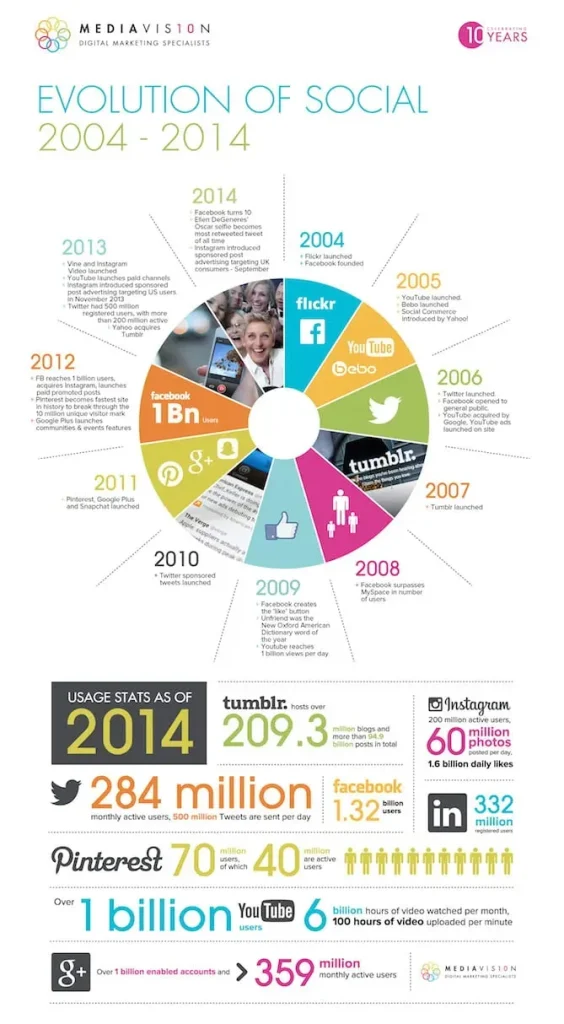The evolution of social media has transformed the way we interact, communicate, and consume content online. Once a platform primarily focused on personal connections, social networks like Facebook, founded by Mark Zuckerberg, are now enmeshed in a complex landscape dominated by media consumption and entertainment, as evidenced during Zuckerberg’s testimony at the recent Meta antitrust trial. The shift reflects a broader trend where the impact of social media is felt in our day-to-day lives, yet platforms are struggling with a decline in user engagement, particularly on Facebook. As we consider the future of social networks, it prompts a critical examination of how platforms are adapting to maintain relevance amidst growing competition from alternatives like TikTok and YouTube. This evolution raises essential questions about the balance between innovation and regulation in a rapidly changing digital ecosystem.
In recent years, the digital landscape known as social networking has undergone significant changes, altering how individuals engage and share information. Platforms originally designed for friendship connections now mirror traditional media outlets, leading to diverse content creation and consumption patterns. This shift has sparked discussions surrounding Meta’s practices and their implications for the direction of these platforms. As we navigate this transformed environment of online interaction, the challenges facing established giants like Facebook underscore a critical evaluation of their future roles in society and commerce. The intermingling of technology, user experience, and regulatory scrutiny forms a larger narrative about the ongoing transformation of how we engage in the digital age.
The Declining Role of Social Interaction on Facebook
As evidenced by Mark Zuckerberg’s recent testimony, social media platforms like Facebook have evolved to prioritize content consumption over interpersonal interaction. In his statements during the Meta antitrust trial, Zuckerberg highlighted a significant shift; the amount of engagement users have with content from friends has decreased sharply, with time spent viewing such posts falling from 22% to 17% on Facebook. This trend indicates a growing emphasis on entertainment and curated media rather than genuine social connections.
The implications of this shift are profound, as users now encounter a rich tapestry of promotional content, influencer-driven posts, and algorithmically generated materials that dominate their feeds. As social media becomes less about personal interactions and more akin to a digital broadcasting platform, the user experience changes fundamentally, suggesting a transformation in how we use these services and our expectations of them.
Mark Zuckerberg’s Insights on the Future of Social Networks
During the Meta antitrust trial, Zuckerberg articulated a vision that reflects his awareness of the need for profound changes in social networks. He acknowledged that traditional models of personal engagement are giving way to platforms focused more on information dissemination, entertainment, and virality. This shift raises questions about the long-term viability of established social networks like Facebook and Instagram, as user preferences evolve towards platforms that deliver novel content in engaging formats.
Zuckerberg’s testimony hints at a critical crossroads for the future of social networks. As competition intensifies from platforms like TikTok and the imminent threat of generative AI innovations, the structure and purpose of social media are being redefined. The industry’s direction could witness a divergence from the roots that platforms were built upon, with a potential move towards more ephemeral and creatively engaging content, challenging existing giants to adapt or risk decline.
Antitrust Challenges Facing Meta
The Federal Trade Commission (F.T.C.) argues that Meta’s monopolistic practices create a chilling effect on innovation and consumer choice in the social media landscape. As the F.T.C. probes previous acquisitions like Instagram and WhatsApp, questions arise about their impact on competition within the market. Critics contend that Meta’s consolidation of platforms under its umbrella stifles diversity, while Meta posits that social media now encompasses a broader spectrum of services where competition thrives.
Navigating through this antitrust case, Zuckerberg’s defense highlights the complexities of defining market competition in an ever-evolving digital space. The notion of what constitutes a ‘social network’ has dramatically changed, blurring the lines between rivals. The challenge for regulators lies in proving that Meta’s ownership of multiple platforms has definitively harmed users—a hurdle made more complex by the free access to services that Meta provides.
The Impact of Social Media Evolution on User Experience
As social media evolution continues to reshape user experiences, there’s a tangible shift in how individuals engage with information and connect with one another. The general audience has grown accustomed to a vast array of multimedia content, moving away from the basic interactions that defined early social platforms. Users are increasingly bombarded with algorithm-driven suggestions that prioritize engagement over personal connection, rendering it difficult for genuine interactions to thrive.
This evolution in content consumption has implications for marketing and brand engagement as well. Businesses must adapt to these changes, innovating their strategies to capitalize on visual storytelling and quick-consumption formats that resonate with today’s audiences. The result is a marketplace where traditional engagement strategies may falter, leading brands to rethink their approach towards fostering meaningful relationships with consumers in a landscape that is continually in flux.
Will Facebook’s Decline Signal a New Era in Social Media?
As Zuckerberg pointed out during his testimony, the decline of Facebook’s traditional user engagement metrics might signify an impending shift in social media dynamics. This decline raises the question of whether we are witnessing the beginning of the end for platforms that once dominated the digital landscape. With the rise of alternative platforms catering to the evolving user preferences, there’s a pressing need to examine what truly lies ahead for social networks.
The convergence of various content formats across platforms means that established norms of user engagement are constantly challenged. While some may see the decline of Facebook as a warning, others may view it as an opportunity for innovation and diversity to reclaim ground in social media. The possibility of diversified platforms catering to niche audiences presents a new frontier where more personalized and meaningful online interactions could flourish.
The Role of Competition in Shaping Social Media
With the F.T.C. questioning Meta’s monopolistic behavior, the role of competition in shaping the social media landscape becomes increasingly crucial. The emergence of platforms like TikTok demonstrates how fresh perspectives and innovative engagement models can capture user attention, challenging established giants like Facebook. As competition intensifies, platforms must rethink their models to avoid stagnation and ensure continued relevance.
This competitive landscape suggests that the evolution of social media may lead to healthier ecosystems, where innovation and user needs drive platform development. As new technologies and capabilities emerge, companies must remain agile, adapting their strategies to not just sustain their user base but also redefine the social media experience in meaningful ways for their audiences.
The Changing Landscape of Content Consumption
The changing landscape of content consumption reflects a significant cultural shift driven by the rush of information readily accessible to users. As social media evolves, platforms increasingly double as content aggregators, which blurs the lines between social connectivity and media consumption. Consequently, users may find themselves experiencing social media not merely as a communication tool but as a curated entertainment feed that prioritizes trends over personal connections.
The evolution of content consumption also introduces new challenges for social media platforms. With user attention spans shrinking and the demand for more dynamic content on the rise, maintaining user engagement becomes paramount. As generation Z and millennials turn towards platforms like TikTok for bite-sized content, traditional giants like Facebook face the critical task of reimagining their approach to keep pace with these rapid changes in consumer behavior.
Potential Consequences of the Antitrust Trial
The antitrust trial against Meta reflects broader concerns regarding the concentration of power within social media and its subsequent effects on freedom of choice for users. Should the F.T.C.’s case succeed in breaking up Meta, the ramifications could reshape the landscape of social media as we know it. The decision could pave the way for increased competition, fostering a healthier environment for innovation and consumer satisfaction.
However, the actual outcomes of the trial remain to be seen. Should protective measures merely result in minor adjustments rather than substantial reforms, debates surrounding user rights and market competition will likely intensify. As the trial unfolds, the technology industry will be closely watching, as its implications could inform future regulations and the overall direction of social media evolution.
Looking Ahead: The Future of Social Media
Looking ahead, the future of social media appears uncertain yet ripe with possibilities as new platforms emerge and existing ones evolve. As users begin to gravitate towards more interactive and engaging experiences, social media companies must embrace innovation while navigating their growing regulatory scrutiny. The shift from traditional social networking towards multimedia consumption highlights the potential for emerging players to fill niches that larger platforms overlook.
Furthermore, the advent of generative AI may introduce entirely new paradigms in how users engage with social media. As companies explore AI’s potential, the landscape could shift more dramatically, allowing for highly personalized content generation that may redefine the social interaction experience online. Thus, the future of social media will likely hinge on how well platforms can adapt to both technological advancements and user expectations.
Frequently Asked Questions
How has the testimony of Mark Zuckerberg impacted the discussion around the evolution of social media?
Mark Zuckerberg’s testimony during Meta’s antitrust trial highlighted significant shifts in social media evolution, indicating that platforms like Facebook have transformed from personal networking sites to more content-oriented media. This change suggests that social media is evolving beyond traditional interpersonal communication, affecting how we interact with platforms today.
What does the decline of Facebook signify in terms of social media evolution?
The decline of Facebook signifies a broader trend in the evolution of social media where user engagement shifts away from personal connections to content consumption. As revealed by Zuckerberg, platforms now host a variety of entertainment and informational content, suggesting that the role of social networks is changing significantly.
In what ways have antitrust challenges influenced the future of social networks like Facebook and Instagram?
Antitrust challenges, such as the ongoing case against Meta, have important implications for the future of social networks. These legal proceedings question the monopolistic practices of companies like Meta and could reshape the competitive landscape, potentially fostering innovation and offering users more choices as social media continues to evolve.
What impact does the Federal Trade Commission (FTC) have on the evolution of social media?
The FTC plays a crucial role in the evolution of social media by regulating monopolistic behaviors and examining market definitions, as seen in the case against Meta. The outcomes of such cases could set precedents that define how social networks operate and innovate, significantly influencing their future.
How can we understand the impact of social media on user communication as discussed in Zuckerberg’s testimony?
Zuckerberg’s testimony points to a critical impact of social media on user communication—indicating a shift from genuine social interaction towards a flood of curated content. This evolution raises concerns about the quality of online interactions and questions the very purpose that social media platforms were originally designed to fulfill.
What are the potential future trends in social media as suggested by recent legal and marketplace changes?
Recent legal challenges, including those involving Meta, alongside the rise of competitors like TikTok, suggest that the future of social media may include a diversification of platforms, more regulatory oversight, and the onset of artificial intelligence-driven networks, all contributing to the ongoing evolution of how social interaction occurs online.
How do current social media practices reflect the broader trends in media consumption and production?
Current social media practices reflect a shift towards content consumption that resembles traditional media rather than personal interactions. Zuckerberg noted that users spend less time engaging with friends’ posts, indicating that these platforms have evolved to prioritize entertainment and broad content dissemination, marking a fundamental change in their original social networking purpose.
What challenges does the FTC face in defining the social media market in light of evolving user behaviors?
The FTC faces significant challenges in defining the social media market, especially as user behaviors evolve, blurring the lines between social networking and mass media. This ambiguity complicates antitrust considerations, making it difficult to assess whether companies like Meta are monopolizing a market that is continuously changing.
How do the similarities between social media platforms reflect the evolution of technology and user expectations?
The similarities between platforms like Facebook, Instagram, TikTok, and others illustrate the evolution of technology driving user expectations for standardized features, such as short videos and messaging. This homogenization across social networks highlights how competition shapes user experiences in today’s rapidly evolving digital landscape.
| Key Points | Details |
|---|---|
| Social Media’s Transformation | Zuckerberg states platforms like Facebook have evolved from social networks to mass media. |
| Decline in Social Interaction | Percentage of time spent viewing friends’ content decreased (22% to 17% on Facebook; 11% to 7% on Instagram). |
| Antitrust Case Against Meta | FTC claims Meta has a monopoly due to acquisitions of competitors like Instagram and WhatsApp. |
| FTC’s Market Definitions | Critics argue FTC’s definition of social networks is vague and outdated. |
| Zuckerberg’s Testimony Insights | Testified that social media now resembles entertainment and learning platforms more than interpersonal networks. |
| Future of Social Media | Concerns about potential bans on TikTok and the rise of generative AI social networks by companies like OpenAI. |
Summary
Social media evolution is underscored by Mark Zuckerberg’s recent testimony, where he declares that traditional social networking platforms have transformed into entertainment and learning venues. This shift indicates a significant departure from what once defined social interaction, as platforms like Facebook and Instagram increasingly resemble traditional media. The ongoing FTC antitrust case against Meta highlights these changes, questioning how these platforms maintain their dominance in an ever-evolving landscape. As users seek more genuine connections and innovative content experiences, the future of social media remains uncertain amid increasing scrutiny and competition.



